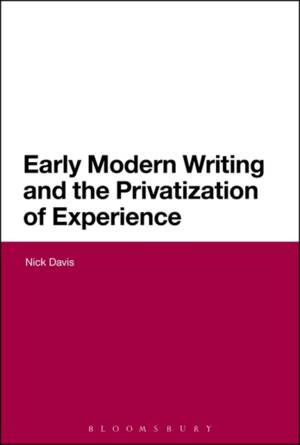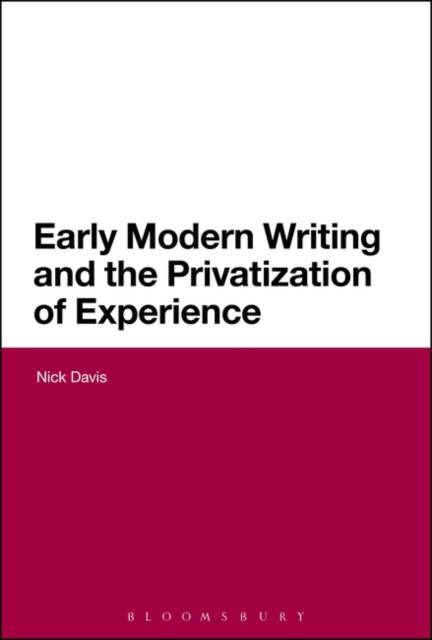
Bedankt voor het vertrouwen het afgelopen jaar! Om jou te bedanken bieden we GRATIS verzending (in België) aan op alles gedurende de hele maand januari.
- Afhalen na 1 uur in een winkel met voorraad
- Gratis thuislevering in België vanaf € 30
- Ruim aanbod met 7 miljoen producten
Bedankt voor het vertrouwen het afgelopen jaar! Om jou te bedanken bieden we GRATIS verzending (in België) aan op alles gedurende de hele maand januari.
- Afhalen na 1 uur in een winkel met voorraad
- Gratis thuislevering in België vanaf € 30
- Ruim aanbod met 7 miljoen producten
Zoeken
Early Modern Writing and the Privatization of Experience
Nick Davis
€ 296,95
+ 593 punten
Uitvoering
Omschrijving
Reading a wide range of early modern authors and exploring their cultural-historical, philosophical and scientific contexts, Early Modern Writing and the Privatization of Experience examines the shift in focus from reliance on shared experience to placing of trust in individualized experience which occurs in the writing and culture of the period. Nick Davis contends that much of the era's literary production participates significantly in this broad cultural movement.
Covering key writers of the period including Shakespeare, Donne, Chaucer, Spenser, Langland, Hobbes and Bunyan, Davis begins with an overview of the medieval-early modern privatizing cultural transition. He then goes on to offer an analysis of King Lear, Richard II, Henry IV Part 1, The Winter's Tale, and the first three books of The Fairie Queene, among other texts, considering their treatment of the relation between individual life and the life attributed to the cosmos, the idea of symbolic narrative positing a collective human subject, and the forming of pragmatic relations between individual and group.
Covering key writers of the period including Shakespeare, Donne, Chaucer, Spenser, Langland, Hobbes and Bunyan, Davis begins with an overview of the medieval-early modern privatizing cultural transition. He then goes on to offer an analysis of King Lear, Richard II, Henry IV Part 1, The Winter's Tale, and the first three books of The Fairie Queene, among other texts, considering their treatment of the relation between individual life and the life attributed to the cosmos, the idea of symbolic narrative positing a collective human subject, and the forming of pragmatic relations between individual and group.
Specificaties
Betrokkenen
- Auteur(s):
- Uitgeverij:
Inhoud
- Aantal bladzijden:
- 208
- Taal:
- Engels
- Reeks:
Eigenschappen
- Productcode (EAN):
- 9781441166821
- Verschijningsdatum:
- 19/12/2013
- Uitvoering:
- Hardcover
- Formaat:
- Genaaid
- Afmetingen:
- 157 mm x 236 mm
- Gewicht:
- 521 g

Alleen bij Standaard Boekhandel
+ 593 punten op je klantenkaart van Standaard Boekhandel
Beoordelingen
We publiceren alleen reviews die voldoen aan de voorwaarden voor reviews. Bekijk onze voorwaarden voor reviews.









